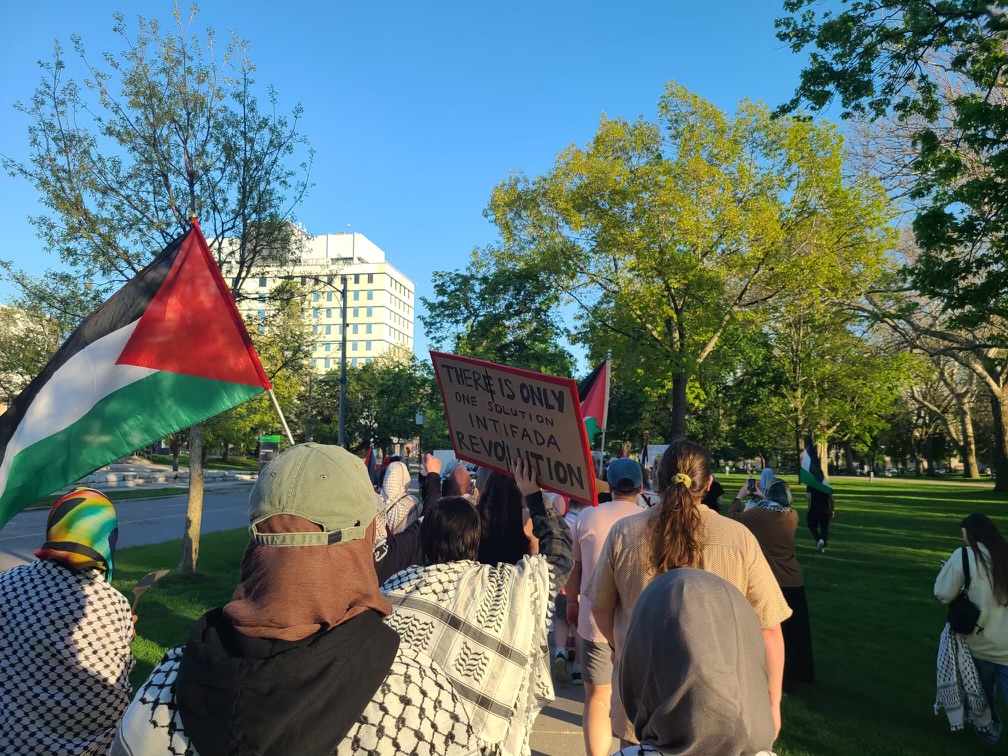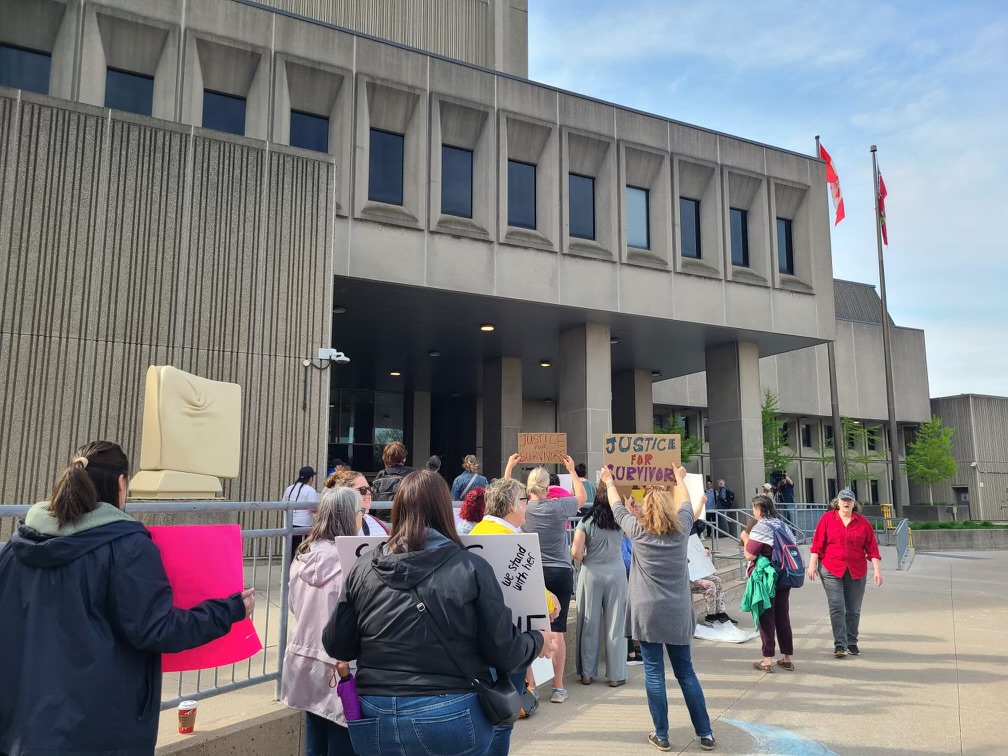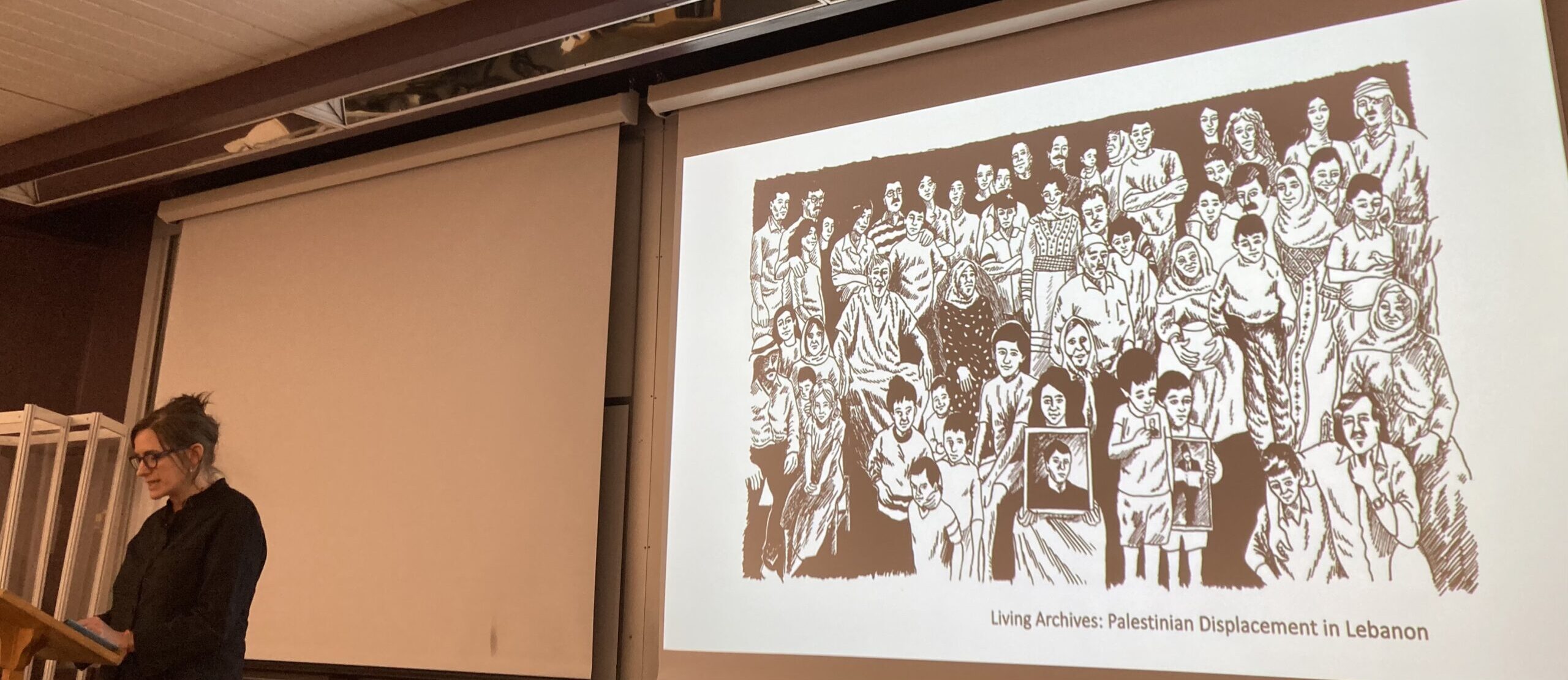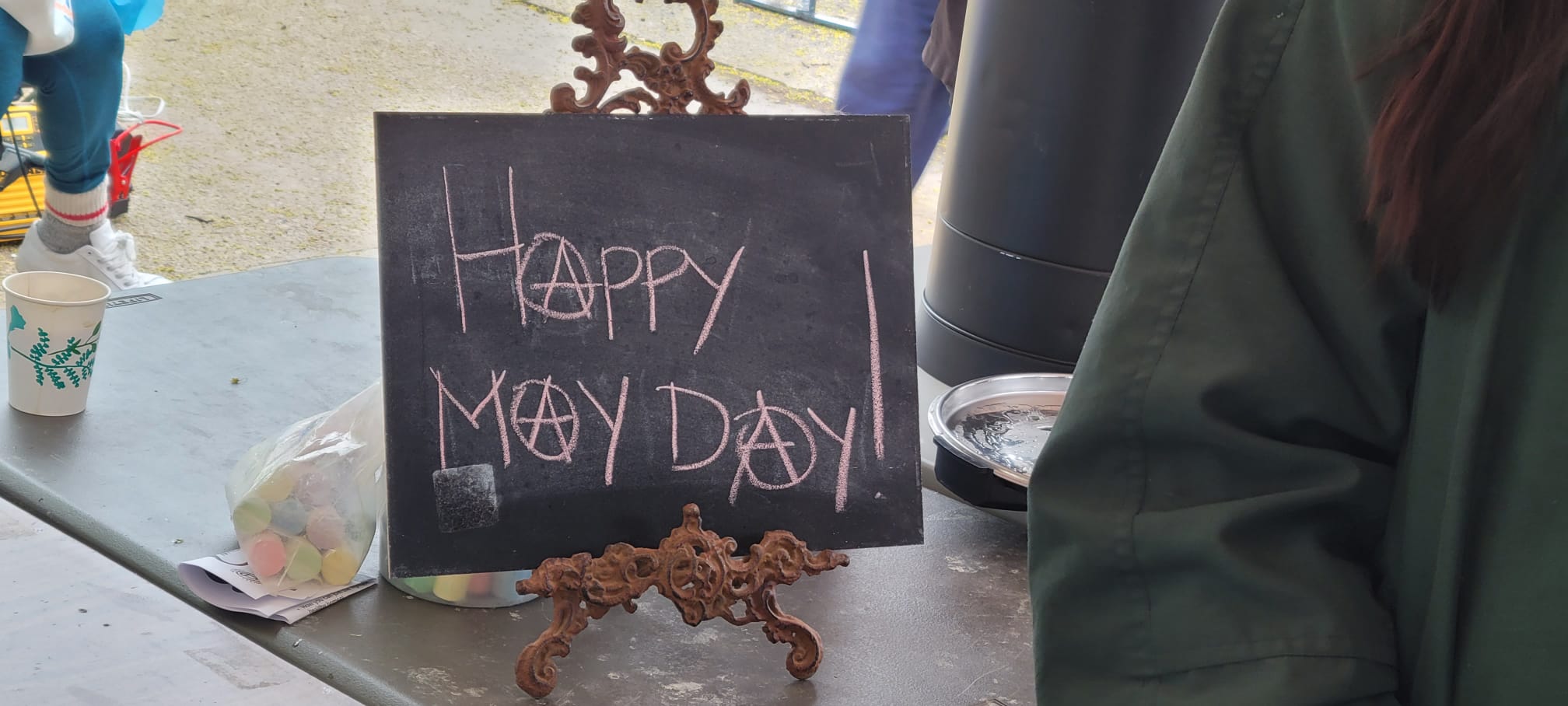What can be done to combat the rise of anti-SOGI protests?
Brynn Colledge
Tue May 20, 2025
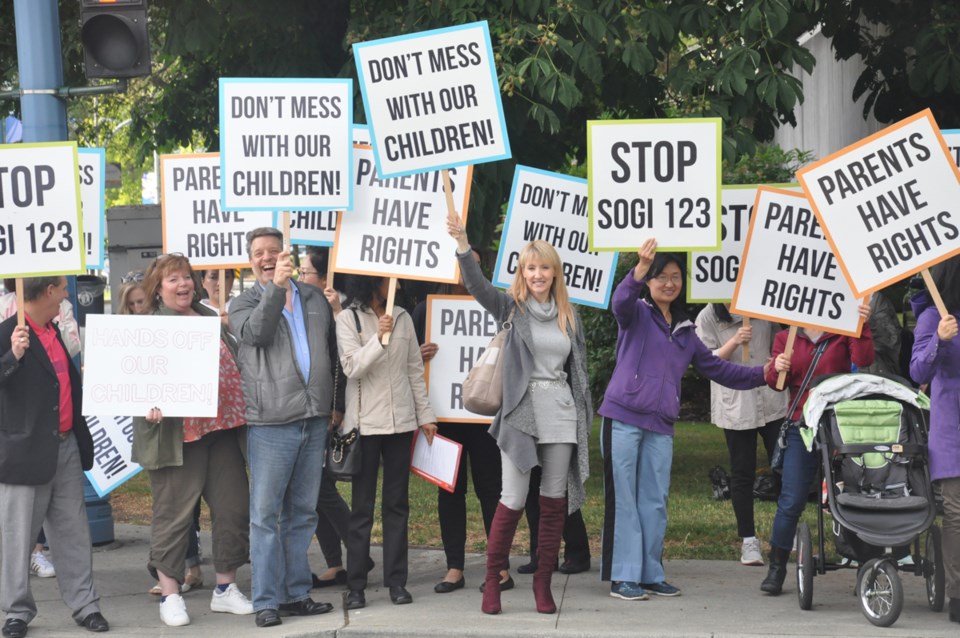
For Western University’s April 30th conference “Showing Up: Solidarities and Feminisms in Times of Crisis”, organized by the department of Gender, Sexuality, and Women’s Studies, I had the honour of presenting a paper I had written in the final year of my undergraduate degree about the rise of protests against SOGI (sexual orientation and gender identity) teaching in schools in Canada during 2023.
In 2024, these protests arose once more, albeit with less popularity, and I suspect they will happen again in 2025. The goal of my essay was to understand what motivates these kinds of protests with the hope of envisioning ways to mediate them. Over a year after writing this work, given the recent political happenings around me — the reelection of Donald Trump in the United States, the election of Mark Carney in Canada, and the division between people based on their beliefs surrounding current events like the genocide in Gaza, Canada becoming the ‘51st state’, and their political parties (Liberal, NDP, Green, Conservative, etc.) — I have found myself asking, again, “so what can be done?”
In my essay, I studied an ethnographic analysis taken from Arlie Russell Hochschild’s (2016) book “Strangers in Their Own Land” where she describes the process that leads people to group together in protest and politics, even when their support of specific causes and leaders are inherently detrimental to them. I applied her analysis, which was originally intended for understanding Trump supporters prior to his first presidency in 2017, to anti-SOGI protests. The process she identified is applicable to various political events that signal a rise in far-right conservatism, such as Donald Trump’s reelection and the election in Canada of a Liberal minority.
SOGI is not a standalone curriculum, but is integrated into existing courses for children. Topics covered in Ontario’s SOGI program, maintained within the elementary school system since 2019, include sexual orientation, gender identity, and intersectionality. The goal of this program is to help students understand their self-conceptions, the formation of their identities, and to promote inclusivity and acceptance of diverse students, parents, families, and school faculty. Following the renewal of SOGI, there were protests in September 2023 and 2024 outside schools and political offices urging SOGI’s abolishment. Since SOGI is not a curriculum and is integrated into everyday learning, parents cannot opt their children out. In Canada, parents have an opt-out option for sex education, but SOGI does not qualify under this option.
The main groups who organized and participated in these anti-SOGI protests are the 1 Million March for Children, Action 4 Canada, and Hands Off Our Kids. These groups are all rooted in the Parental Rights movement which began in 1970 and has since branched into numerous current day organizations, all of which use the threat of victimizing children in schools to gain an audience when it comes to issues surrounding 2SLGBTQIA+. Despite their separate names, these groups all share the same catchphrase of wanting to “protect” children from what they perceive as being sexualized, indoctrinated, and/or exposed to sexually explicit materials. Typically, their aversion is to anything related to queerness — they believe that knowledge and acceptance of queer identities will lead their children to become queer.
The Hands Off Our Kids website shares information about marches and protests against the SOGI curriculum, video resources, and free downloadable posters with slogans such as “protect our children.” According to the website, the movement’s goal is to protect children’s rights, freedoms, and religious affiliations by stopping “LGBTQIA+ ideology and indoctrination” from being taught in schools.
From Hochschild’s framework, the following four interrelated motivations can be used to explain the SOGI protests and the psychology underlying conservative “parental rights” movements.
1 – Feeling like a Stranger
Hochschild describes the feeling of ‘being a stranger in one’s own land’ that can arise within a person as a result of changing political climates, media mainstreaming of issues one may not agree with, changing of laws, governmental aid, and social politics. As these things change, the person develops feelings of isolation and estrangement in their own land. Nostalgia and longing for things to return to how they once were envelopes them. As the new implementations of school curricula and laws begin to support minority groups against the wishes of politically right-leaning persons, they begin to feel misunderstood and forgotten.
2 – Losing control
Hochschild describes ‘deep stories,’ which are essentially stories formed by feeling rather than fact or critical judgment. Deep stories are formed over the course of a lifetime and build what she describes as ‘empathy walls’, barriers to understanding people with whom one disagrees. Empathy walls can cause a person to become indifferent or hostile toward those they disagree with. As marginalized groups begin receiving privileges and rights, people with empathy walls perceive a loss of their own rights and a resulting loss of pride in their country; all the while, they are slandered for holding onto old fashioned views. This leads to feelings that they themselves are marginalized. They react to this loss of control by joining with like-minded people to rise against the legal, political, and governmental changes that support the marginalized groups they do not often know or understand.
3 – Moral Panics
Grouping together helps those who feel isolated by progressive policy changes to gain some level of immunity to these changes. This immunity to change is so influential that people may reject new information about policies if it does not suit already formed beliefs. Threats to the status quo and order of social dominance are the main factors that bring such groups to protest. Moral panics happen when the political difference between the right and left becomes the difference between right and wrong, good and bad, constructing imminent threats to the nation. These fears are invented by often privileged individuals who fear losing their status to marginalized counterparts.
By positioning themselves as victims and amplifying their fear of political changes, the moral panics of conservative right-leaning people portray changes in gender and sexuality norms as threats to the family structure. The inclusion of SOGI in the Ontario curriculum represents a shift in governmental support for the marginalized 2SLGBTQIA+ community; this feels threatening to Canadian conservative-leaning persons, adding nuance to the heteronormative deep stories formed in childhood by creating awareness and acceptance of queer people. It is representative of the death of the family, masculinity, and heteronormative gender beliefs. Doug Ford’s statement that schools were “indoctrinating children” helped mobilize fear and loss of control, increasing moral panics and the ferocity of protests.
4 – “Protecting the children”
The notion of ‘protecting the children’ is not new, beginning in the 1970s with the Parental Rights Movement. Intentional word choices — such as “indoctrination”, “sexualization of children”, and “protection” — are meant to instill urgency and fear among supporters who believe their children will be harmed by queer acceptance. This framework fuelled the protests that took place in September of 2023 in Ontario and around Canada. Paul Preciado argues in his (2019) book, “An Apartment on Uranus”, that children are becoming the ultimate political tool of the far-right for enforcing the heteropatriarchal system of the family and oppressing the queer community. The children in these cases are all presumed to become heterosexual adolescents, and in order to maintain this “purity”, they must never know that homosexual, trans, and non-binary people exist. According to a 2023 article from The Socialist, the Parental Rights Movement has also “been weaponized to exclude discussions of racism and Black and Indigenous history, and to challenge mask mandates during the height of the COVID-19 pandemic crisis.”
Children cannot fight back against such censoring forces. They become the tool used by the Parental Rights Movement to incite fear among parents: children cannot protect themselves from harmful knowledge that is ‘threatening the family unit’, so right-wing adults must do it for them. Heterosexuality is understood as the ‘norm’ in society, so a normalization of queer identities can be seen as a threat to the status quo. Indoctrination is the main fear within these conservative groups: if children become knowledgeable about sexual orientation and gender identity, they might turn out to be gay or trans.
The argument that there will be more people who identify as gay or trans in the future based on education is unreasonable because these issues are mainstream: children will inevitably interact with them as they enter adolescence and adulthood. Raising ignorant children will not stop them from realizing their possible queer identities, but it will make such realizations more difficult to articulate because of their lack of education.
The making of a conservative
A politically right-leaning conservative is born from deep stories and feelings of isolation as their world changes in ways they do not agree with. These deep stories, which are learned in childhood, are not subject to change in most cases. Political leaders who spread stories that paint conservatives as victims position historically marginalized people — such as the 2SLGBTQIA+ community and people of colour — as those who are victimizing them by gaining rights. These moral panics are mobilized to protest when conservatives join together in shared deep stories; they are pushed to action by someone influential with political power, such as the church, a person in politics, or a celebrity.
So what can be done?
This analysis brings me back to the question I started with: “so what can be done?” I can’t say there is one simple answer, but I want to draw attention to the issue of education.
1 – School curricula should remain inclusive and unbiased
The political climate in Canada and the United States has been uncertain and stressful with regard to education. Trump has already mobilized to eradicate the US education department in order to give individual states the right to dictate educational curricula. He has additionally attempted to ban critical race theory and diversity, equity, and inclusion (DEI) programs in schools. These efforts are echoed in the moves Alberta, New Brunswick, and Saskatchewan have taken to prevent children from exercising their right to go by different names and pronouns at school without parental consent.
Many “parental rights” groups have resources on their websites encouraging parents to homeschool their children out of fear that they will be “indoctrinated” at school. The prevalence of homeschooling in Canada has increased since COVID-19, but the call for children to remain at home after the return to in-person learning in 2023 is on the rise. Positioning schools as inherently dangerous places for children because of the inclusive environment they are promoting for 2SLGBTQIA+ children and parents is deeply concerning.
2 – We should get into the habit of fact-checking information
The conservative party in Canada, like in the US, relies on campaigning false information to mobilize fear and panic among their supporters. Instilling fear surrounding trans rights, access to puberty blockers for minors, and children’s sexual education is one of the ways that Poilievre has gained popularity within the Conservative Party. Mark Carney did not form a majority government for the Liberal party in Canada, with the conservatives close behind, which shows that many Canadians believe misinformation, are not exercising critical thinking, and are not fact-checking the information provided by their political leaders.
Proper education is lessening. Education is fundamental because it is most often how we learn critical thinking, and where we are challenged in our beliefs. Curriculum control is one of the ways that the West maintains colonial control around the globe, asserting Eurocentric standards which attempt to extinguish other cultural life and knowledge. The power to control what children learn in school cannot be understated: it is one of the places where the deep stories I spoke about in my presentation are formed.
3 – We should shift our views of children and education
Viewing education as a human right which extends beyond the issue of parental rights or parental ownership over children could be the first step to combating anti-SOGI rhetoric. This is a right that must be fought for in the current political climate. Ignorance will not prevent queer children, as I said in my conference presentation, nor will knowledge necessarily create them. By disallowing certain knowledge from being taught, and deciding to homeschool children out of fear they might learn about a variety of politically fraught issues such as 2SLGBTQIA+, critical race theory, and the history of colonization, ignorance can breed hatred and misinformation, which can have dire consequences — fascism, racism, desensitization to hate and mass violence, and the ability to ignore and/ or justify genocide.
We are witnessing these consequences unfold. It is not only in the US under Trump’s fascist government, but also in the West’s general ignorance when it comes to the atrocities taking place in the Middle East, Africa, Asia, Europe, and Latin America, most notably the genocide in Gaza and the recent attacks in illegally-occupied Kashmir that brought India and Pakistan to the brink of nuclear war.
Committing to educating ourselves, learning to fact check information, and critically thinking about information presented to us by political leaders, the internet, and the media is one way to mediate this threat of misinformation surrounding queer rights, education, and laws.
